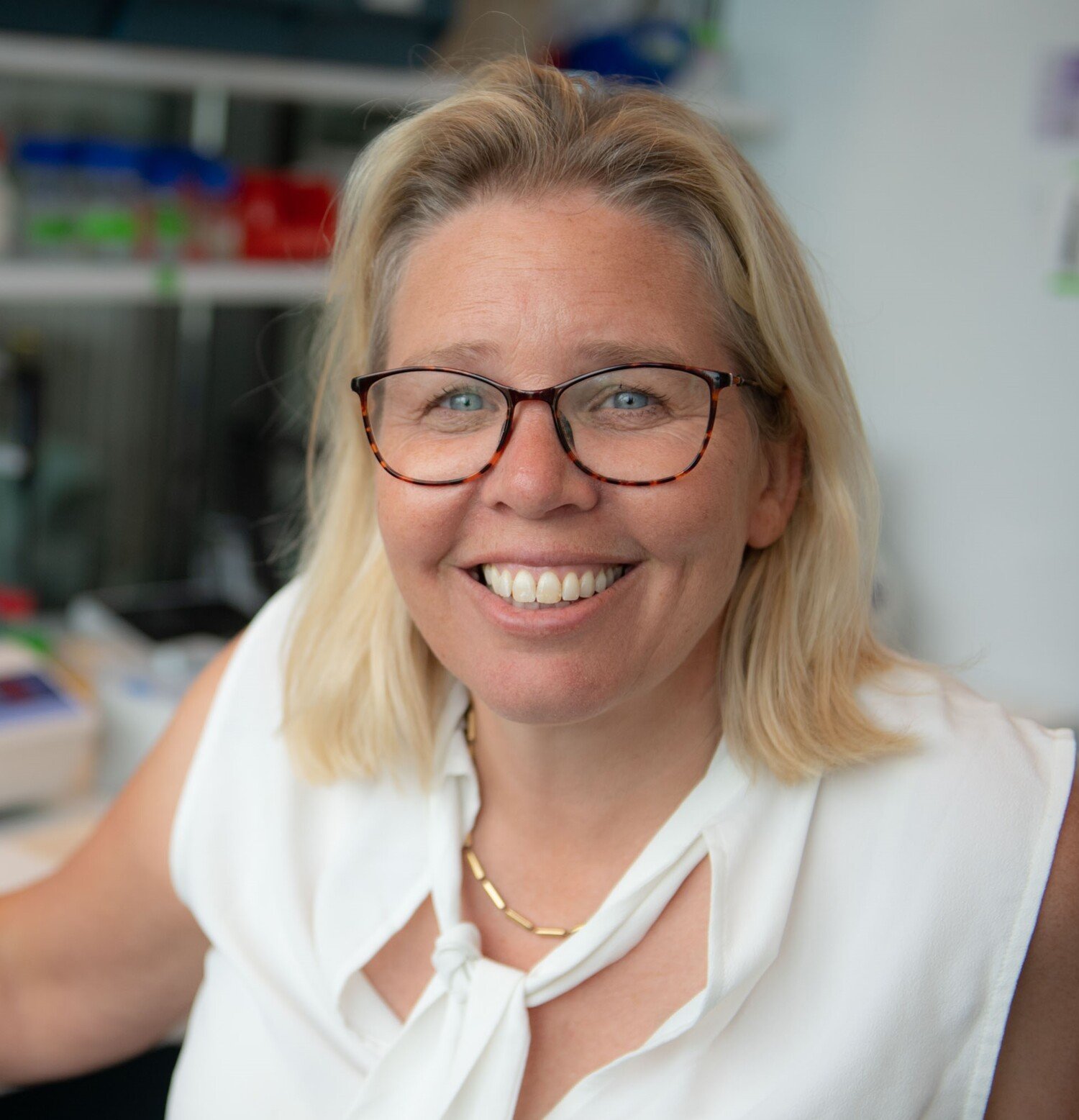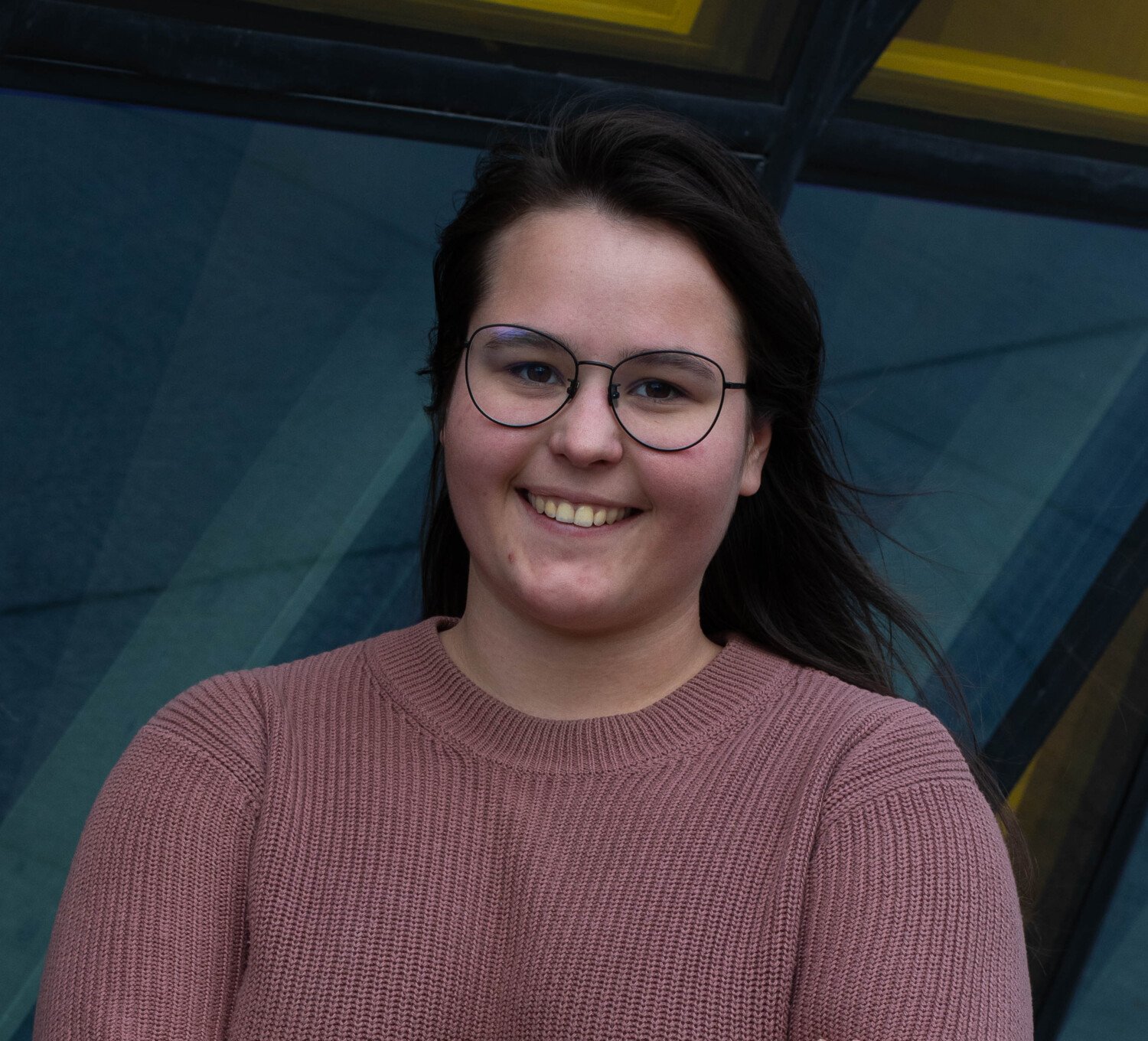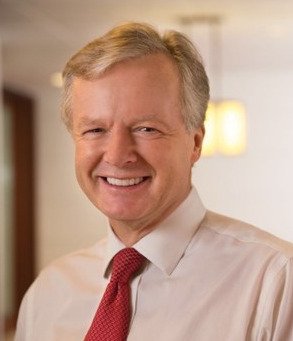A few voices from the Department of Physiology and Pharmacology
Read the interviews with some former and current employees and students from FyFa.
Name: Sophie Erhardt
Role at FyFa: Head of Department
Time spent at the department: Joined the department in 1997 as a student and did a thesis on the regulation of dopamine cells by GABA-B receptors.
Fun fact: I have played football throughout my entire upbringing, something that has meant incredibly much to me as a person, researcher, and leader. Football has taught me how much community and cohesion matter, and how important it is for everyone to have a common goal that they strive to achieve together. I started playing football when I was 7 years old, that team, with essentially the same players and coach, then won the girls' Swedish Championship, and as we transitioned to senior level, we went straight through the league system, from division 3 all the way up to the top league. Even today, us players meet several times a year.

Tell us about your time at FyFa:
I spent the first four years at FyFa as a PhD student. After a postdoc in San Diego, I came back to FyFa and started my own research group. 2006 I became associate professor and 2016 professor. In 2022, I became Head of Department at FyFa.
From the very beginning, my time at FyFa has been characterised by community, joy, commitment and inspiration - it is always fun to go to work. No two days are the same! For me, personal meetings are incredibly important, as is developing myself while developing others. It is fantastic to be able to alternate teaching with taking my own courses and doing my own research. Being a researcher is a lifestyle, it permeates my whole life.
Name something you find particularly interesting about FyFa's history:
There have been so many amazing discoveries here in physiology and pharmacology, and I think it's because we have had an open climate of dialogue that drives innovation. There have sometimes been quite heated discussions over the years, but always with respect. We have a strong sense of community and value our core subjects very highly.
The dynamics of the department have led to major discoveries, such as the discovery of noradrenaline as a neurotransmitter, and of prostaglandins.
What is the most important thing FyFa is doing right now, in your opinion?
The most important task for the department going forward is to highlight the importance of physiology and pharmacology, for example in analysing big data. If you can't relate your findings to physiology and pharmacology, they are not worth much.
Where do you think FyFa will be in another 25 years when we celebrate 100 years?
I think we are a department that has found the balance between teaching and research, where we are central to nurturing new researchers in physiology and pharmacology. That we are an important player in the field in Sweden and in the world. That we make a difference for the individual and the patient.
Name: Jon Lundberg
Role at FyFa: Professor, Vice Head of Department
Time spent at the department: since autumn 1993
Fun fact: My supervisor Jan Lundberg has an almost identical name. Believe it or not, but this was the main reason why I started here. I went up to his office and said “we have almost the same name, can I start researching here?” He laughed and said yes!

Tell us about your time at FyFa:
There was no thought in my mind that I would ever do research, I would become a doctor with a stethoscope and take care of patients! But AT was not available in Stockholm when I finished my studies so I thought, oh I'll check out research, it might be fun! It took one day and then I was hooked, I met Eddie Weitzberg on day one and we continued as a duo. I realised then that, without knowing it, I had always wanted to do research. I love to compete, to play, to not have to report to a boss and have a lot of freedom, what else could I do?
Name something you think is particularly interesting about FyFa's history:
It's hard not to mention that we've had a Nobel Prize laureate (Ulf von Euler) here, it's not a common thing!
What is the most exciting thing FyFa is doing right now, in your opinion?
The most exciting thing is clearly the young, extremely talented research groups that have joined us. Talent is beautiful.
Where do you think FyFa will be in another 25 years when we celebrate 100 years?
I firmly believe in a revival of the subjects physiology and pharmacology, and we need people in Biomedicum who understand how a body works. Many people may think the topics are boring, but I think we have managed to keep up well here at FyFa, we still feel relevant. It will never be irrelevant to study how more complex biological systems work.
Name: Karolina Juhani
Role at FyFa: Second year master’s student studying the Translational Physiology and Pharmacology programme
Time at the department: 2022 - …
Fun fact: I am part of the first ever international master’s programme organised by FyFa.

Short about your time at FyFa:
I am fairly new to the department as the Translational Physiology and Pharmacology master’s programme only started in the autumn of 2022. As students, we have the opportunity to learn about many (if not all) of the research areas that different groups in FyFa are involved in throughout our two years here.
Anything that you find especially interesting regarding FyFa’s history?
Most of my knowledge about FyFa’s history originates from snippets that our lecturers and professors have mentioned when a certain topic comes up. These are often about the major discoveries made by current or previous FyFa researchers and the impact on their respective fields. There are also great stories about mishaps or funny occurrences that have preceded some of these discoveries, reminding us that innovative science doesn’t happen without overcoming a million tiny failures on the way.
What is most exciting about FyFa right now?
For me, the most exciting part is to see how the FyFa-lead master’s programme will develop and what will become of the future alumni. The programme is a great way to introduce curious and ambitious students to groups in FyFa, the rest of KI or the industry and forge an extensive network of young scientists that will be forever connected by their time and experiences at FyFa.
How do you see FyFa in another 25 years, when the department celebrates 100 years?
I hope to see a continuation of the vibrant multicultural research environment that has expanded itself both in terms of the number of groups and research fields as well as in its involvement in providing excellent education to aspiring researchers from all backgrounds. I look forward to the integration of the most modern research techniques and available technologies which could enable the translation of novel discoveries to applicable solutions for the improvement of health across the globe.
Read more in Karolina’s blog at KI.se: Karolina - Translational Physiology and Pharmacology, författare på Student blogs (ki.se)
Name: Jan Lundberg
Role at FyFa: Alumni (former professor in neurotransmission research), but also mentor to a current PhD student. Sometimes I visit and try to meet my old PhD students. KI is very close to my heart!
Today: Sits on boards and advises venture capital groups in the pharmaceutical industry. Previous managerial positions in research at AstraZeneca and Eli Lilly.
Time at the department: Joined in 1978 as a PhD student and left as a professor in 1995.
Fun fact: I used to roller ski to the department (about 10 kilometers) in preparation for 28 completed Vasalopp! I am a person who likes to be outdoors in different ways.

Tell us briefly about your time at FyFa:
I came from Gothenburg in 1978 and became a PhD student in the pharmacology department. I graduated in 1981 with a thesis on neurotransmitters in the nervous system. I had a very exciting time at the department until I left for the role of head of preclinical research at Astra in 1995.
I stayed at the department as a research assistant on the research council and then got a research position - I didn't want to leave KI! I had been in the US for a longer time before, as a hockey player in Minnesota, so I didn't feel the need to go out into the world. However, I had early contact with the pharmaceutical industry, which made me move abroad eventually anyway.
At FyFa, I had opportunities to be involved in research projects in medical applied substances and tested new substances from pharmaceutical companies in our models. Human experiments were very important - I was actually a test subject myself and levels of exhaled nitric oxide were measured on me. I became allergic to rats and mice, and they took the opportunity to use me as a subject to develop the NIOX test that is used for allergic children today.
In 1993 I took up a professorship in neurotransmission research and a few years later I moved on to new challenges.
I had a great time at FyFa that was characterised by many collaborations, both within the department and with other departments at KI and KS. I really learnt the importance of seeing other people's competences and areas of expertise, of working together. I have benefited greatly from this later in my work in the pharmaceutical industry.
Name something you find particularly interesting about the history of FyFa:
Von Euler's Nobel Prize for noradrenaline as a sympathetic transmitter cannot be ignored. It was - and is - great for the department and for Sweden.
Where do you think FyFa will be in another 25 years when it celebrates 100 years?
Of course, it depends entirely on the people and forces that drive the department, but I see three main tasks:
1) Teaching healthcare professionals (including dentists).
2) Research
3) Societal benefit, discovering new diagnostics or drugs that benefit society.
A balance between these three provides the best possible conditions for a department that has viability and creates value.
Anything else you would like to add?
I would like to emphasise the benefits of having a background in the department's subjects. Not only as a practitioner and researcher, but also in the pharmaceutical world. With a PhD from the Department of Physiology and Pharmacology, you really have a wide range of opportunities, which I have enjoyed during my own career.
